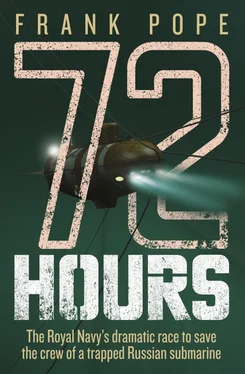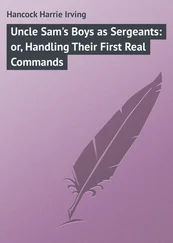Twenty minutes later the navigation calculations were complete. It was close, but they could do it. The pilots had already got clearance for a route into Filton and had turned on to that heading in anticipation. It would not have been difficult, given the presence of the examination crew, to play cautious and decide there was not enough fuel on board, but they didn’t. The decision saved the submarine rescue mobilisation a solid four hours.
Friday, 5 August/Saturday, 6 August
SS + 34 h
14.30 UK – 17.30 Moscow – 02.30 Kamchatka
AS-28 , 210 metres beneath Berezovya Bay
Gennady Bolonin grunted with effort as he shuffled from the middle of the huddle to take his turn at the outer edge. He’d barely begun to feel the warmth of being sandwiched between two bodies and it felt too soon for it to be his turn in the cold, but he refused to allow any ill-temper to show in his face. With his long experience it was he, more than anyone else, who should be leading by example. And if anything was going to save them from this situation it was discipline and strong character. Without that, those canisters of V-64 had no hope of seeing them through.
It was dim in the chamber. Was it dimmer than it had been? Were the batteries giving out already? Or was this carbon dioxide poisoning starting to make his senses fade? He forced himself to concentrate, and that’s when he noticed that there were only five men on the floor beside him.
Bolonin hauled himself upright and on to one of the steel shelves that served as seats. He waited for five minutes until the heaving of his lungs subsided, then made his way slowly through the hatchway to the forward compartment. Inside he found the pilot Milachevsky manning the underwater telephone, and beside him one of the junior midshipmen. Both were scrawling on notepads, which they blearily attempted to put out of sight when they noticed he’d appeared.
Writing farewell notes wouldn’t go down well with the Captain, but Bolonin put a hand on each of their backs. He didn’t speak, but they knew what his touch meant. What he’d seen would go no further. Not that his old comrade Captain Lepetyukha looked as if he’d have the energy to object even if he had seen them. He was slumped in the aft compartment, his chest heaving. It was an open secret that their captain had lost a third of his lung in surgery, and now all of the younger crew members were looking concerned about him.
Seeing the men pen their last words on damp paper was an awful reminder of the notes written by those who had survived the Kursk ’s explosions, only to be discovered when the wrecked hull was recovered months later. Captain-Lieutenant Dmitriy Kolesnikov had written the names of all 23 survivors, and a brief, stoic message:
Olichka, I love you.
Don’t suffer too much. My regards to
GV and regards to mine.
Mitya
‘GV’ were the initials of his mother-in-law, while Mitya was the shortened, familiar form of his own name. Later, in the cold darkness, he’d estimated their chances of survival at between 10 and 20 per cent, and concluded:
Regards to everybody; no need to be desperate.
Kolesnikov.
Another note had been found among the bodies of those exhumed from the recovered wreckage of the Kursk , this one from Senior Midshipman Andrei Borisov:
If you are reading this note this means I am dead. But your lives will carry on and I am asking that my son becomes a true man, like I used to be.
Bolonin didn’t try to stop the crew writing letters to their loved ones. Why shouldn’t they? They were already putting up with a lot. The cold, the damp, the thirst, the hunger, and the claustrophobia of the body’s screams for fresher air. The stink did not help. This was a rescue submersible, designed for a maximum of six hours beneath the water. A sailor was expected to hold his bowels for that amount of time. But not 30 hours. With no facility on the vessel, the crew were making do with an empty V-64 can, which they sealed as best they could with a rag.
When it came to urine, the boat was better prepared: there were a few sealable polyurethane bottles on board. Bolonin was watching them fill with a drugged curiosity. He’d been put in charge of rationing out the precious drinking water that remained, and he estimated that ten times more fluid was coming out of the men than was going in. Slowly but surely their bodies were drying up. The cold might be terrible – made more so by not being able to deploy the traditional defences of a Russian against the winter, beating your arms, smoking and vodka – but it was the thirst that was foremost in his mind.
Bolonin had made his own calculations of how long the seven of them might be able to survive on the V-64 canisters, and from there decided the water ration. Three times a day he passed a plastic mug between them, with the words ‘I declare time for watering.’ Each man was allowed just one gulp.
Watching the men’s desperate eyes as they followed the mug from mouth to mouth – both before they’d drunk and afterwards – made Bolonin’s spirits sag. He’d spent his life designing some of the world’s best underwater technology for the Russian Navy, but they were now trapped aboard one and were threatened by the most ancient of the dangers that mariners face: thirst. Water, water, everywhere, nor any drop to drink.
Never had the two faces of the Russian Navy been clearer to him. As an engineer, he knew how beautiful the nation’s best technology could be. When the plans for the great battlecruiser Yuriy Andropov were first announced in 1986 their splendour was undeniable. Yet it took ten full years for her to be launched, by which time battlecruisers had gone the way of the battleship, and become an outmoded weapon in naval warfare. After the Soviet Union collapsed, the ship (renamed Peter the Great ) was declared the pride of the Navy and the flagship of the Northern Fleet (indeed she was the target that the ill-fated Kursk was supposed to have been firing upon when the explosion had occurred), yet just last year she’d been laid up in the drydock. The Commander-in-Chief of the Navy, Vladimir Kuroyedov, had announced she had been badly maintained and could ‘explode any moment’, adding that she was especially dangerous owing to her nuclear reactors. If this was the fate of one of the country’s most prestigious vessels, what hope was there for the humble AS-28 ?
Friday, 5 August/Saturday, 6 August
SS + 34 h 30 mins
15.00 UK – 18.00 Moscow – 03.00 Kamchatka
Royal Navy Lodgings, Stoke Gifford, Bristol
The walls of Commander Riches’ staff lodgings near Bristol began to reverberate with the distinctive roar of a Nimrod’s Spey turbofan engines. Riches threw a pair of waterproofs into his bag – his staff had said the weather would be just like Scotland – grabbed his passport and headed out of the door.
The Shell oil exploration vessel from Sakhalin Island was still 48 hours away. Airlifting Shell’s ROVs had been discussed, but dismissed as unworkable: none of the Russian vessels in the area could take a helicopter transfer. The French Ministry of Defence was also offering an ROV that could be flown at six hours’ notice, but the ISMERLO team still regarded the US Deep Submergence Unit as the best option. It would be tight. Their estimated Time to First Intervention was roughly equal to the predicted survival time as could best be calculated from the confusing Russian reports.
Thanks to the Squalus rescue 70 years beforehand , the US Deep Submergence Unit’s Rescue team liked to wear T-shirts that boasted of being ‘The Only Proven System’. Smug bastards, thought Riches. If he got a chance, he’d like to consign those shirts to the bin. He wanted to prove what he strongly believed – that the UK’s Submarine Rescue Service was the most effective rescue unit in the world. If it was, it was largely thanks to a dramatic change that had occurred since the tragedy of HMS Thetis and the days when submariners were expected to save themselves.
Читать дальше












